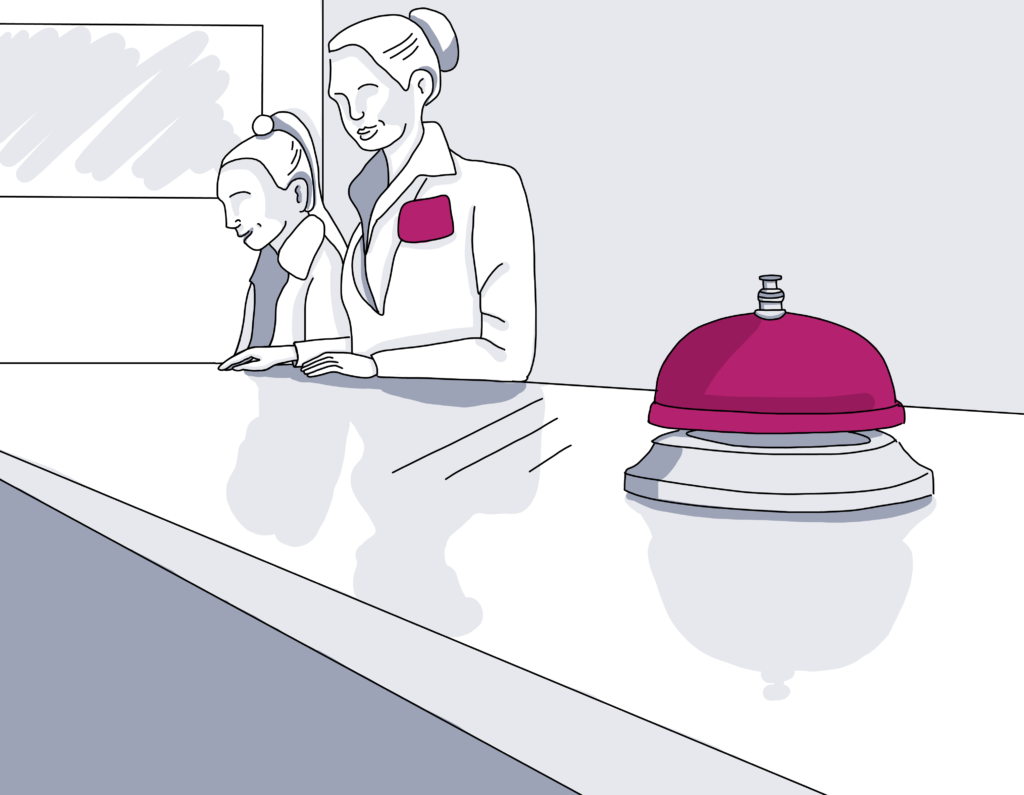
Wednesday Wisdom: The Guide to Making a Competitive Advantage Strategy for a Hotel
The competitive landscape for existing hotels is more challenging than ever, with new brands, concepts, and distribution channels opening frequently. In this crowded environment, smart lodging operators are finding creative ways to stand out from the competition. While gaining this edge won’t happen overnight, these 10 keys to creating a competitive advantage in the hotel industry can guide your strategy.
Explore 10 ways to hone a hotel competitive advantage strategy

1. Identify the competition’s advantages to tailor your own
Knowing the specific advantages the competition leverages allows you to create your own stand-out features and services.
First, create a short list of direct competitors that are similar to your property in terms of location, price point, audience, and concept. Now that you know who the competition is, you can focus on their strengths and weaknesses. Where are they the clear winner? Do they have on-site F&B that draws in groups? Are they a select service property that commits to 5-star customer service? Where do you take the lead? Do you clearly outshine the competition when it comes to in-room amenities?
Mirroring your competitors’ strategies won’t win the battle, but awareness of their specialized niches and unique vulnerabilities can help guide your tactics. Highlight your nearness to the beach and stellar ocean views if they outdo the partially obscured views of competitors. If your indoor pool can’t match the themed rooftop pool next door, find another outstanding feature to call out in promos.
Porter’s Five Forces Framework is a helpful model for evaluating the competition, measuring opportunity and profitability, and guiding strategic decisions.
2. Create authentic relationships through guest feedback
It’s more expensive to attract new business than to cultivate relationships with returning groups. Listening to guest feedback offers valuable insight into what you’re doing right”and where to improve. Engage with planners via social media and travel website reviews to build relationships and increase brand loyalty.
Responding to all reviews (positive and negative) is essential. These reviews may also highlight improvement opportunities. If you note overwhelmingly positive check-in experiences for individuals but sluggish and confusing check-ins for large groups, perhaps you need to streamline your group check-in process.
Rewarding guests creates a sense of trust, and trust leads to repeat stays. A loyalty program earns extra data, which can be used to design personalized experiences and targeted offers. Forge long-term relationships by offering a group loyalty program to encourage corporate events, conferences, and more at other hotels across your portfolio.
3. Make ˜value added’ meaningful
Well-implemented perks and extras are a gateway to competitive advantage, as long as they are tailored to your audience and property. While ˜free’ can be a strong selling point, the word may devalue the service for some audiences. Value-conscious traveling sports teams will appreciate free breakfast, while corporate retreat executives may prefer luxury add-on excursions or experiences, such as a brewery tour with dinner and a tasting flight.
Value for your audience may depend on the guest receiving something extra that they would not have gotten otherwise. But, if the incentive doesn’t align with the customer’s values, there’s a missed opportunity for connection. A complimentary bottle of champagne at a romantic dinner is not a one-size-fits-all offering”draw in youth athletic leagues with kid-friendly welcome kits or tempt conference attendees with unrestricted access to the internet or video streaming services during their stay. Finding appropriate perks for your audience can differentiate your property from the competition and help you attract new guests.
4. Streamline Direct Booking
In this age of instant connection, planners value a quick and easy booking experience. OTAs and travel booking services lure guests with convenience and promises of low prices, but guests who book directly are 12.5 percent more profitable for hotels. Leverage direct booking with price incentives, upgrades, and added perks”and ensure a convenient, simple, and mobile-friendly process. Make sure the booking option is easy to spot, streamlined, and no more than a few steps from start to finish.
Booking through the hotel website offers an opportunity for add-on services, too. Provide direct booking incentives with offers for room upgrades, free food and drink, complimentary shuttle services, vouchers, and discounts.
Finally, direct booking offers the opportunity to connect with group event planners before they set foot on the property. Try emailing vouchers for free desserts for the whole group, sharing events that are happening in the area during their stay, or offering additional nights at a discount for guests to extend their stay after the conference has ended.
5. Modernize: Stay ahead with high-tech solutions
Staying on top of innovative technology can make all the difference. An outdated website won’t earn the same trust as a website with a modern look Likewise, antiquated methods within your property are likely to turn guests off.
- Allow online check-in/check-out for added convenience.
- Ditch the room key: Provide an alternative with a mobile app or RFID card that unlocks the door based on proximity.
- Upgrade business centers to high-tech, comfortable co-working spaces that will appeal to traveling professionals and local remote workers alike. Locals who use this flexible space close to home may prefer the brand name while traveling, especially if a loyalty program is available.
- Often, website visitors are looking for answers to specific questions, and live chat is their preferred method of customer service. Deploy hotel chatbots for instant answers to common questions, booking assistance, local recommendations, room service requests, and more”leaving front desk staff available to focus on the guests in front of them.
- Customize reports and gain insight with hotel CRM software to provide personalized service.
- Establish your property as the local expert for group activities: Integrate a digital itinerary builder on the website so guests can create a plan for where to go, what to see, and where to eat”before they arrive. Include the list, vouchers or discounts, and additional recommendations with their check-in materials.
6. Build unforgettable brand experiences across the portfolio
Garner attention and buzz with elements (on-site and off-site) that offer guests a unique experience. From simple touches to extraordinary gestures, help your brand stand out in this world of ˜copy and paste’ group business. Go above and beyond to provide an unforgettable experience, ensuring offerings apply across the portfolio to establish brand consistency guests can count on.
Some ideas to inspire your own:
- Upgrade the morning coffee routine with in-room latte brewers in each hotel.
- Exhibit artists local to each property on a gallery wall in the lobby; your locations will become micro art museums worth browsing.
- Cater to kids’ sports leagues by scheduling Friday night magic shows or a movie night.
- Include a personalized ˜welcome’ sign in the lobby on check-in days for family reunions.
- Call out conference-going thrill-seekers looking for excitement by touting a nearby adventure experience”and arrange for a shuttle service for after sessions have ended.
- Build a fondue or s’mores bar guests will remember, share on social media, and brag about when they return home.

7. Streamline access and polish interactions
Prime locations are an undeniable draw: Proximity to the airport or a central position in a bustling neighborhood can earn a competitive advantage because your property is front and center.
But whether your hotel is in the thick of it or further afield, make sure you help your guests get around with ease. Groups, in particular, don’t want to grapple with complicated logistics to transportation hubs, or to reach local restaurants and entertainment.
Ensure area maps are easy to find in the lobby and guest rooms. Offer regular van service to and from local dining and shopping districts. Offer a fast and streamlined valet service, so guests never feel stranded. A welcome email with travel information, local attractions, and transportation links can go a long way towards making guests feel welcome.
Prioritize the reliability and availability of staff and support personnel through every step of the process”from the research phase, booking, and check-in through the entire stay, check-out, and necessary follow-up. Avoid the bland How was your stay? at check-out”instead, ask open questions to facilitate thoughtful responses or consider a questionnaire to gauge customer satisfaction.
8. Leverage digital content to engage with guests
As more hotels offer free Wi-Fi, there is an increased opportunity to engage with guests directly through digital content. Properties can cater to the connected traveler with location-specific offerings, valuable area information, or offers tailored to that guest’s stay.
Make it easy for event planners and event attendees to become brand ambassadors by highlighting hashtags throughout the hotel and on the properties’ digital assets. Create engaging visual displays on-site so that guests can share images via Instagram. Real-time social feeds on a hotel website can generate excitement and, as a bonus, increase the amount of time visitors spend on the site. Create a guest-generated hashtag mosaic and harness the power of User-Generated Content (UGC) to grow brand affinity.
All of your digital efforts will create opportunities for engagement with your guests and increase their feelings of loyalty to your hotel.

9. Solve problems”but welcome them, too
While preventing problems in the first place may be regarded as a mark of success, there is a benefit in problem-solving. A Gallup poll suggests that issues that seem ordinary to hoteliers”limited table availability or check-in snafus”can be enough to ruin a guest’s experience or create an actively disengaged customer. The vast majority of guests won’t bring up the issues with hotel staff, so a problem can go unnoticed and uncorrected, leading to more unhappy guests.
Providing phenomenal customer service to resolve problems for group business shows responsiveness and care, which creates engagement and loyalty. Group CRM software can track performance, help identify problem areas, and facilitate collaboration across properties. For example, consider a family reunion organized at one hotel that would be a far better fit at another nearby property because of outdoor amenities and family-friendly local attractions. The sales team can make the pitch to the group, which demonstrates thoughtful attention to detail and is a customer-service win no matter the family’s final decision.
CRM software can also flag loyal customers and priority group engagements portfolio wide so staff can keep an extra eye on them to ensure satisfaction”and save the day should issues arise.
10. Stay agile to sustain your advantage long-term
Business sustainability comes from versatility and relevance in your market. New competing properties emerge, prices fluctuate, and the playing field shuffles. Without making creative changes and upgrades, offerings become stale and the competition can creep in to gain the advantage.
Free Wi-Fi and early check-in may have been the gold standard, but keep in mind that cable TV”and prior to that, color TV”used to be a sign of luxury, too. Guests are looking for more in their stay than channels they’ll never watch or Wi-Fi that crawls, especially with a speedy unlimited data plan in their back pocket. Listening to the target audience and anticipating their needs and wants can keep properties ahead of the curve for a sustainable competitive advantage. Keep an eye on the market and trends relevant to your group business segment with these tactics:
- Set up Google Alerts to track brand mentions across the web.
- Follow social media feeds and blogs for competing hotels and see which of their offerings are performing well.
- Sign up for deal alerts and subscribe to the competitor’s email newsletters to see what deals they’re offering.
- Keep an eye on SEO and see what competitors rank for consistently using SEM Rush, Ahrefs, or Screaming Frog.
- Scour reviews websites to see where your competitor needs improvement, then deliver those services impeccably.
- Pay attention to indirect competitors as well as the brands with whom you compete directly.
To create a competitive advantage, know your strengths and weaknesses”then compare them with the competition. A key to gaining the advantage lies in improving the groups’ experiences. Providing outstanding service means going above and beyond what is considered standard. These 10 keys can guide the process as you build a portfolio’s strength and gain an edge.
Looking for more ways to boost group engagement and gain an advantage? Explore creative hotel amenities and high-tech hospitality solutions to set your properties apart from the competition.

